The Economics and Statistics Division maintains archives of previous publications for accountability purposes, but makes no updates to keep these documents current with the latest data revisions from Statistics Canada. As a result, information in older documents may not be accurate. Please exercise caution when referring to older documents. For the latest information and historical data, please contact the individual listed to the right.
<--- Return to Archive
For additional information relating to this article, please contact:
March 19, 2025NEW BRUNSWICK BUDGET 2025-26 The Province of New Brunswick tabled its provincial budget for 2025-26 on March 18, 2025.
New Brunswick's 2025-26 projects a deficit of $599 million after a $50 million contingency provision. This is up from the $399 million deficit now forecast for the 2024-25 fiscal year. New Brunswick's deficits are projected to narrow, but not close, over the subsequent three fiscal years.
For 2025-26, New Brunswick's revenues are projected to grow by 4.0% from the latest 2024-25 forecast while expenditures are planned to rise by 4.9%. In the subsequent three fiscal years, annual revenue growth is projected to fall between 3.3% and 3.5% while expenditures rise between 2.3% and 2.5% per year.
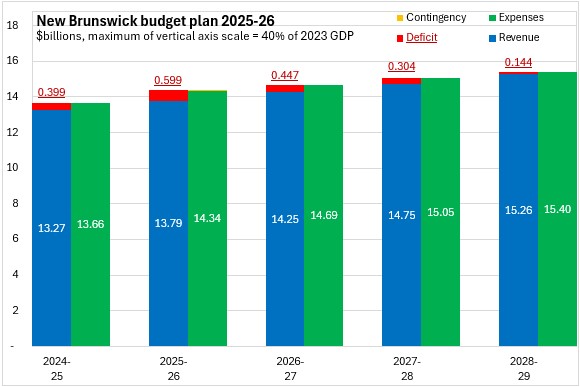
Measured as a share of GDP, the footprint of provincial government in the New Brunswick economy amounts to 28.5% of GDP in 2025-26 . This is projected to remain fairly stable in the subsequent three fiscal years, edging down to 28.3% of GDP by 2027-28.
New Brunswick's 2025-26 deficit amounts to 1.2% of provincial GDP estimated for 2025. In subsequent years, the deficit is projected to contract to 0.3% of GDP by 2028-29.
New Brunswick's net debt is projected to rise from 26.6% of GDP in 2025-26 to 28.5% of GDP by 2028-29.
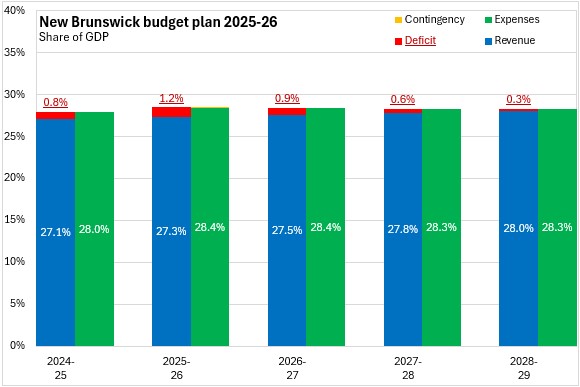
New Brunswick's 2025-26 Budget expenditures amount to $16,636 per capita, funded by revenues of $15,999 per capita and a deficit of $695 per capita. Expenditures per capita are projected to rise by $933 per capita in the next three fiscal years while per capita revenues rise $1,405.
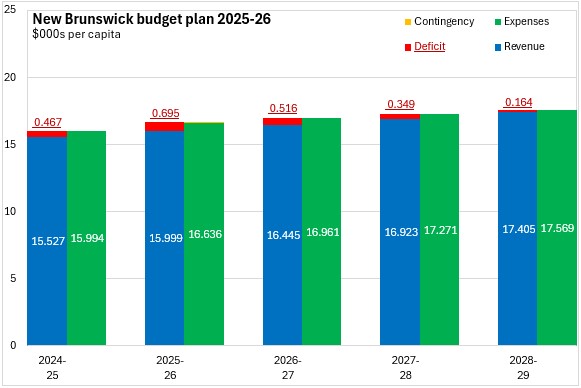
New Brunswick's revenue projections are similar to those forecast in the 2024-25 Budget while expenditure growth is faster than in last year's Budget.
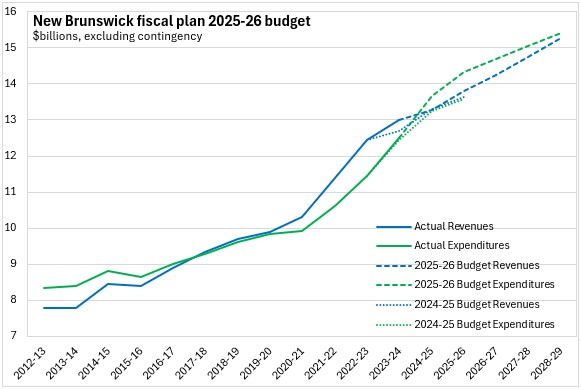
With faster growth in expenditures and little change in the outlook for revenues, New Brunswick's Budget deficits are now larger than anticipated in last year's fiscal plan.
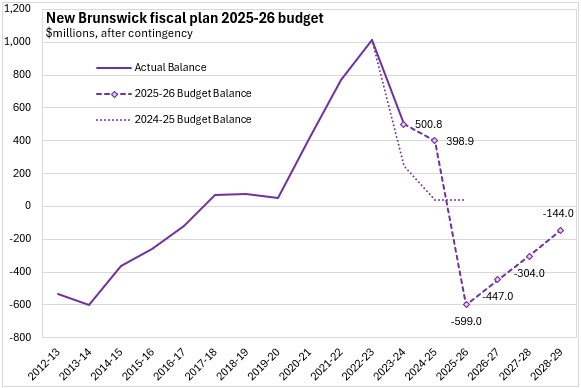
New Brunswick's economic growth is projected to slow in 2025, with real GDP rising by 1.1% and nominal GDP growing by 3.2%. The deceleration in New Brunswick's economic growth is attributed to softening labour markets, income and investment as well as the impacts of US tariffs on major sectors of the economy. Part of the anticipated New Brunswick export shock is expected to be offset by foreign exchange rate depreciation as well as the ability of exporters to find other markets internally within Canada as well as in other countries around the world. Despite these mitigations, New Brunswick's economic outlook anticipates lower prices for major export products. In the medium term, New Brunswick's economic outlook could be improved by some major projects in energy, forestry, food processing and public infrastructure.
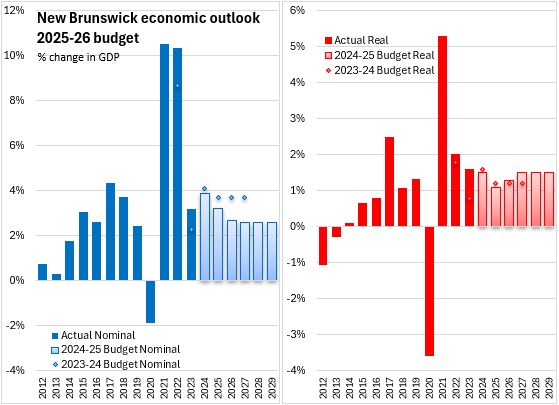
Key Measures and Initiatives
New Brunswick's 2025-26 Budget recognizes the significant changes to the economic environment from the threat of rising tariffs. Key measures include:
Responding to tariffs
- New Brunswick's Budget includes a $112 million provision for a support package that spurs productivity, maintains competitiveness and retools for the future
- The New Brunswick Budget for 2025-26 also includes a $50 million contingency reflecting uncertainty in the economic outlook because of an unstable tariff landscape.
Prioritizing health care
- $30 million for community care clinics
- $28.4 million to modernize health care information systems
- $15.9 million for added physician remuneration as well as $2 million to expand health care recruitment from within Canada and around the world
- $1.9 million to increase access to fertility treatments - funding one round of in vitro fertilization treatment per household
Youth and education
- $19 million more for school lunches, using local foods where possible
- $10 million for supporting children with exceptional needs or traumas
- $8.7 million for early detection and intervention in cases of youth at risk
- $200 million over 5 years to add 17,000 child care spaces
- $16.4 million more for teachers to address rising student enrolments
- $2.1 million more for academic support teachers
Supporting aging New Brunswickers
- $22 million for nursing homes and specialized beds
- $10 million to make home care more affordable
- $2 million to implement a dementia strategy along with $1.5 million for continued implementation of the Aging with Dignity action plan
- Expansion of respiratory syncytial virus (RSV) immunization, making vaccines free for those aged 75 and older
Housing
- additional $36.6 million in the New Brunswick Housing Corporation.
- $21.1 million more for the rental benefit (2,500 households per year)
- $4.6 million more for the Affordable Rental Housing Program
- $3.3 million for public housing repairs and modernization
- $2.3 million for the 3% rent cap, along with outreach and awareness programs
New Brunswick Budget 2025-26
<--- Return to Archive